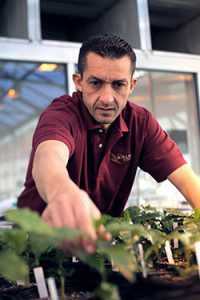COLLEGE STATION, TX, US – Dr. Leonardo Lombardini, Associate Professor in the Department of Horticultural Sciences at Texas A&M University, has recently joined World Coffee Research ( WCR ) as Deputy Director.
“Leo brings a set of experiences and skills that allows WCR to extract the best and most advanced scientific resources from Texas A&M and other Land Grant Universities and integrate them into our very applied and practical strategic plan to increase Arabica coffee productivity and quality for the global coffee industry,” said Dr. Timothy Schilling, Executive Director of WCR, when announcing Lombardini’s arrival.
“His organizational and personal skills will allow us to tighten our research program in producing countries and expedite the delivery of transformational results for the sector.”
Born and raised in Italy, Lombardini has always been an enthusiastic coffee drinker, but when he began to teach International Horticulture, his interest in coffee as a plant and as a livelihood for millions of people around the world developed.
The course examines the origin of most common and less common horticultural commodities, the social/economic aspects related to their cultivation, and the issues associated with their international trade.
His interest was reinforced by research projects he had in Guatemala and Costa Rica, in collaboration with the Borlaug Institute and the AGTEC program.
“I am extremely honored to join WCR at the start of what I am convinced will be an incredible journey to become one of the world’s most important authorities for coffee research.
With the leadership of Dr. Schilling, the research network already in place and the existing support of the industry, all elements are in place for this to happen and excited to be part of it,” said Lombardini. His research focus is plant physiology, especially in relation to gas exchange and environmental stresses. He has conducted research and published several refereed publications on several aspects of the physiology of pecan, including the effects of insect feeders on photosynthesis, the consequences of foliar zinc application on leaf anatomy, the effects of canopy management on yield and crop quality, the variation in anatomical characteristics in leaves across several provenances, and the consequences of nitrogen fertilization on root development and activity.
He has also published results from research conducted on several other species, ranging from apple to rose and live oak, and has investigated the nutritional aspects of pecans and their properties in relationship to human health.
Source: World Coffee Research – Photo Credits: WCR



















